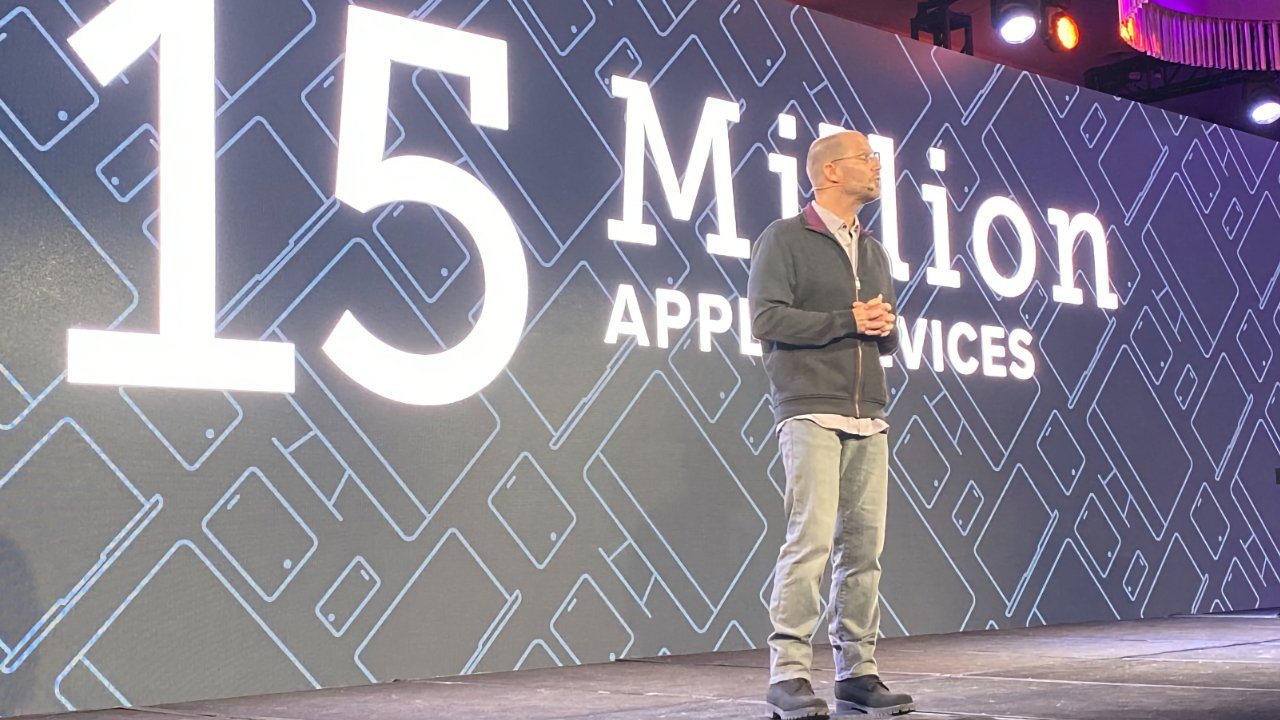I read this article 20 years ago.
It’s got the same energy as the “year of the Linux desktop” meme. I think that the mobile space will be Apple-dominated first, then laptops will come later as the PC market naturally shrinks and starves off less-profitable players à la the current tablet market.
Good news! Save it for 20 years and read it again! 😁
Min maxed
I’m guessing there’s a bit of source bias here. I’ll buy that Windows won’t be dominant in 10 years, but defaulting to Apple doesn’t seem backed by the data presented.
Yea, most enterprises that I know of are looking at VDI. I don’t think Apple has made any effort in that area?
Apple won’t dominate the corporate space because then they would have to support the corporate space. They know if they do that their products will be common, and they couldn’t charge the premium they do. Then the people that demand corporate support their Apple products wouldn’t be rebels sticking it to The Man. Would doctors and C-Level wannabes really feel special if they didn’t have to throw their weight around to get IT to accept Macs? If that common, dirty, IT troll just sauntered up from the basement with a fully supported Macbook Air ready to go, it would take all the “I feel SPECIAL” out of the experience. And that is what Mac users pay for.
Is that how apple users see themselves?
I’ve always seen them as gullible hipsters paying more than they need to because of the logo.
I refused to buy Apple products for 15 years. Recently I grabbed a whole set of them and honestly, there’s only one thing I can say. It just fucking works.
I’ve been using Linux/Windows for the better part of two decades and I’m just at a point where I don’t care to tinker anymore unless I have to, I just wanna have stuff that works especially when it’s related to work stuff. Apple stuff is just reliable in that sense, oh my Android phone decided to crash on itself? Yeah my iPhone has had 0 crashes all year I’ve owned it. My M2 Macbook Air has superior battery life and portability at a more reasonable price than pretty much any competitor on the market?
Yes certain Apple things are beyond stupid expensive, Hello Apple TV 4K 128gb being £180 on launch?
But when I want something to work and not have to think about it, the apple stuff fits that need.
I think Apple users typically fall into one of a few different categories:
- “I’m a creative/visionary”
- “I don’t really understand computers”
- “I need a native Unix command line”
deleted by creator
I think both of these assumptions are wrong. I think most apple users are just people who aren’t “computer people” and want an operating system that just works to do the things they want, and are ok with paying extra to not have to worry about drivers or linux/windows issues.
Of course there are apple fanboys, but I don’t think they are the largest subset of users.
-Sent from my iPhone.
Not necessarily Apple being dominant, but the only thing that you need is a Web browser and no one will give a shit what you run that on, Windows, Mac, Linux, ChromeOS
Unlikely…MS Office is still the default for many enterprises today. 365 Office online version is not convenient. OSX version is deliberately made worse to entice people to use Windows
Microsoft has done an excellent job achieving parity between Mac and Windows by making the Windows version worse, as well.
I just want you to know this brightened my day with a sensible chuckle.
Google Docs is fast becoming the standard office suite in a lot of organizations.
Maybe for newer organisations.
But not for large oranisations. And when some jobs depend on creating the shiniest powerpoint presentation in the world, MS Office is unlikely to go away for now.
some jobs depend on creating the shiniest powerpoint presentation in the world
Basically all consulting everywhere.
Not even Office anymore, theyve got multiple levels of ERP systems linked in a with Azure resources for doing lots of core business functionality and automation which is becoming more and more a requirement, i.e. if your business can’t send/receive EDI you can’t sell to most major stores like Walmart/Kroger/etc.
Google’s presentation software is on par, if not better than Office, especially for embedded YouTube/videos for demos.
MS used to have a large moat on office suite functionality. But Gdocs has largely closed the gap.
What would you describe as large?
The company I work for is a multinational at this point and exclusively uses Google for Mail/Docs. We have I think 600 stores now across 12 countries.
I’d like to see all the public sector in the UK suddenly be able to afford apple devices.
The council I work for is fully in on MS365 after Covid forced them to accept remote work.
I hope so. Competition would make Windows a better product. Most of innovation that Windows has had in the last 10 years it’s all about getting telemetry and adding ads.
It would be good if the change was towards Linux, but it seems more likely the transition will be towards an increasingly restrictive Android, reflecting how phones have become people’s primary computing devices, so I’m not looking forward to it.
My guess is the future will just be a subscription service for everything.
With the push to SaaS for so many enterprise apps you have a lot less lock in for windows as an OS.
I really hope this will not be the case.
It’s a real shit show for a small business to correctly setup their MDM and account sync. One of the hardest parts is getting those shitty devices into the Apple registry, i.e. connecting the device with a Business (Account).
Unless Apple drops the price of their devices by at least a third, it’s not really going to happen.
Another thing to consider is that Jamf will certainly not be dominating the Apple MDM management solution arena in a decade either.
Companies with a mostly win estate with win infra, aren’t happy with paying another $40 per user, per year for Jamf and Intune will be making up a lot of ground for a one shop solution, even if management is not as featured or complex as what Jamf offers.
The bigger problems Apple has are their enterprise device and user management, and the fact that many businesses are still reliant on Windows-only software.
Most companies I’ve worked for buy machines that usually aren’t much cheaper than Apple equivalents, at least in terms of MSRP, despite the quality often being worse. My work-provided 2022 HP Z-Book 15 is more expensive as configured than my personal M2 14" MacBook Pro, and is still a shittier machine in just about every objective (and subjective) way I can think of. This is because enterprises typically buy business class laptops like Lattitudes and ThinkPads rather than lower cost (and less durable) consumer oriented machines. That said, it is not uncommon for IT departments at large enterprises to pay well under MSRP for these machines when buying in bulk.
This is my small company. We used to buy cheap computers (like even from Best Buy or Wal-Mart…the then CEO was super cheap), but then we (I) always had to deal with bloatware and just crappy computers that wouldn’t last a year before I started getting complaints that they were slow or just acting up all the time. When he left, I started buying business-line computers directly from the OEMs. They’re not necessarily cheap. The Dell and sometimes HP laptops we buy average about $1500. Even before the pandemic and inflation that was true.
On the other hand, I also support a handful of Apple users, mainly in the Marketing/Communications team, and all but one have M1 Macbook Airs. They cost like $800. And they’re amazing. I bought a Mac Studio for our web designer/video & graphics editor and it only cost like $2000, I think. It too is a beast.
When I worked at a small MSP, some of the C-suites and biz owners I supported wanted powerful Windows laptops. Rarely for any work-related reason; they just wanted something better than the “peons.” They sometimes paid around $2000 for them. And like you mentioned, they were often still shit.
Yeah, imagine the public sector in cash strapped nations battered by inflation all managing to move to apple in a decade, ain’t happening.
Sticker price isn’t that big a factor in enterprise in my experience. For one thing, Dell, HP, and Lenovo’s enterprise PC lines are more expensive than their consumer lines, so the difference isn’t all that big. Also, there have been many studies showing that Macs offer a lower TCO than Windows PCs.
I can see this happening, though it will vary widely by industry for sure. I’ve been working in roughly 50/50 Mac/PC offices for over a decade now. Users like Macs, Apple has good enterprise management and security features, and Microsoft is kind of shitting the bed with their cloud migrations. Microsoft lives by inertia and backwards compatibility, and they’re throwing away that advantage by making these transitions difficult.
I would love to use Linux on my work PC but our IT is too lazy to figure out how to put their corporate spyware on it.
As someone that both runs Linux at home as a daily driver and runs an infrastructure and ops team for a company.
The threats against the two are totally different and modern businesses need things like detection and response capabilities. Most of which don’t have Linux desktop counterparts.
I thought all modern EDR tools had a Linux client?
They do but they are built for server use.
I used Linux for my work PC for a year and had endless problems. If it was my personal pc that would be fine but I was wasting time that I should have been using to complete my work, instead spending that time debugging constantly changing problems
Funny, that’s my daily experience using corporate windows boxes.
I think you’re born either able to use Linux trouble free or able to use Windows trouble free
Or you’re me, and can use neither trouble-free. I’m basically this man.
Mine has been super smooth as a workstation for 7 years. But I think that is the fragmentation issue with Linux. I chose a distro based off of a corporate one and random dude uses Hannah Montana Linux expecting same results.
True, the solutions people would give to my problems almost always involved installing a new disro, and usually it was a different distro in each answer
So your spare time is worth less than your working time? I feel the opposite way.
In my spare time nobody is going to ask me to justify why I delayed a meeting by 10 minutes because my screenshare wasn’t working
Fair enough. I feel like both of my time, working and spare, is worth more than fiddling with Linux. I want to use my computer when I want to use it. Not fight it.
This is happening in my workplace. Almost all new hires request a Mac over windows
Would Linux not be a better call? Both upfront and maintenance cost would be much lower without question.
BuT mACs ArE s0 pReTtY
In practice not really. Linux is great on servers or specialized workstations, but for general end users it just doesn’t work out. I could get into why, but it essentially boils down to support and compatibility.
I migrated our company from Windows to RedHat and Macs, but I wouldn’t put macOS on a server* nor would I put RHEL on a sales guy’s laptop.
*except things like build servers.
Annecodotally I have run it for 7 years including high end CAD. it has been much more stable and predictable than Windows.
I just installed Mint on my personal desktop. So far it’s pretty solid and I’m not missing anything from windows. A little bit of glitchiness but not bad. And while I’m a developer, I’m not exactly a Linux power user - outside of basic directory commands, I have to Google anything.
All I’m saying is from the end user perspective it’s fine other than Firefox tabs crash on me from time to time. Idk about from a provisioning or management standpoint.
Provisioning isn’t bad, management isn’t either. I actually prefer it in regards to Windows, but I am very biased. Ansible and Satellite is the chef’s kiss IMO, but people make strong points against it. I personally use Fedora and macOS, I totally get the comfy feeling Linux can give.
Wouldn’t a RHEL or similar distro which offers enterprise support be a good solution? Also, tech folks are very comfy on Linux as it’s how the internet basically operates. A distro with enterprise support and fully functional GUI that’s similar to windows seems like a solid solution to move from windows. What makes you hesitant to run RHEL on a sale employees computer?
Firstly, because the sales guys aren’t technical. They are smart, but not computer smart. The value proposition of having them learn GNOME to do work would never fly with the suits. The big Cs would rather eat the capex and just give them Macs and never hear about it again. I also greatly enjoy not having to help the important ones with pressing technical issues. As far as GNOME has come, it isn’t a replacement for Aqua or Explorer just yet. It’s a death-by-a-thousand paper-cuts situation that still has a ways to go.
Additionally, workstation RHEL also isn’t quite as bulletproof as the server variant. Such is the nature of the Linux graphics stack. We had a kiosk PC fail to boot to graphical target two weeks back because of an update that nuked dbus. It was just a Grafana kiosk so who cares really. Hasn’t happened again since, but it shakes confidence you know? The servers, however, have been minimal in their issues. I think the only major issue we ran into this year was libvirt imploding on an on-prem server. The post-mortem was interesting on that one.
When your app vendors write their apps for Windows, no. You could try moving everything in Citrix or VDI, but then you’re still running Windows and doing it with more costs.
Wine would allow for windows software to run on Linux. This would add additional potential software problems, but you wouldn’t need help from only Apple to fix em.
Unsupported. And you know that.
I’d love to. Personally I use CAD software that doesn’t have a native Linux option or (good) FOSS alternative. Also, there’s a lot of work done in Excel. No way my company is going to find a transition away from Windows to be attractive.
The cost of the OS itself is insignificant.
You’re still paying for the hardware, still paying for warranties, still paying for support, and most importantly, still paying for IT staff. The cheapest platform is generally going to be the one that requires the least support staff to manage.
IBM has found that Macs are significantly cheaper in the long run, owing to increased productivity and reduced support costs. See https://www.computerworld.com/article/3452847/ibm-mac-users-are-happier-and-more-productive.html
Maintenance cost would double with Linux. “Oh no my os updated because i clicked update when it said I had out of date apps and now my screen is just black when I boot”
Thats why you would have client machines on SUSE with autosnapshots for reverting back, or like proper IT don’t give client machines the root password and take user out of sudoers group.
Honestly, in my 12 years as a software engineer. Not once have I had a work computer I didn’t have full admin access to. It’s just not great to work like that. Additionally, in my line of work, I always need some random piece of software like Microsoft Teams, slack, zoom, discord, etc, for a meeting. This isn’t usual in Fortune 500 companies but in the smaller businesses I’ve been a part of, people will always have a new software requirement. Locked-down Linux clients might work for the slow sludge of mindless business that is Fortune 500 or large business but small businesses need to be able to do things quickly and stay flexible.
As.a tech company our systems are open for tinkering, but clients we do contract work for have fully locked down systems. No software install is possible, and software they do need has to be requested via their control center store app, if IT approves it it will show up in the software store. It is obviously as you say slower to turn things around, but IT ensures that attack footprint and system integriity is maintained. More companies are like this than not like this—when they have more than about 20 employees.
If you say so, I’m in the games industry and I’ve worked in about 40-100 employee studios for the last 10 years. Before that, I was at Comcast and T-Mobile as a software engineer. The games industry might just be an outlier because every employee is tech savvy.
Yeah, I think the difference besides tech savvy, is also development like jobs vs production work. production clients you want all the same and no user f@ckery
And they get to choose? Never worked for a business where that was true.
I work for a marketing agency which has a mix of typical office roles (accounting, HR, sales) and industry specific positions (mostly creatives and developers). The former are normally used to Windows from previous jobs or school, and the exact opposite is true of the creative departments. So, choosing which platform each new hire prefers is standard for us (and has been for more than a decade).
It really depends on the position and the business. If you directly create value it’s pretty easy to make the ask, and they’ll probably say yes. Some businesses however are too burdened with vendor lock-in or lacking IT skills to make it happen.
I heard NASA does. If you have a speciality of a small group and the top person in your field used to using X you get X.
Haha I actually enforced this when I started my current job. New hires get Macs, and if you want a Windows machine you have to justify it. In which case, you get a Thinkpad. I went from weeding through Intune daily to checking Jamf twice a week.
Let’s see. I work at a huge corporation (tens of thousands employees each with his own laptop). Until now: only windows, currently since a few years HP Elitebooks (the suck completely if you need a little bit power) and optionally some zBooks.
Some months ago they introduced MacBooks as another option. But with less support and some things a bit more complicated as the corporation completely relies on the AD user management.
Unfortunately we have a ton of custom made software applications or specialized software which - of course - run only on windows. So currently, the MacBooks are only an option for the typical Outlook, PowerPoint, Excel user.
I don’t see this being transferred to complete Mac compatibility within the next 10 years. Probably step by step (we just started using Codebeamer as our Requirements Engineering tool, which is completely web based. That’s nice. :)
But that’s just the first step. We‘ll see in a few years.
Isn’t apple working on a WINE fork to run windows apps on mac OS?
By the way I’m not sure if Microsoft would be that sad if people would use Macs more than windows. As long as Microsoft can continue to sell Microsoft365 and alle their other Azure services. That’s where they make the money. They don’t really make money with windows.
And with Satya Nadella Microsoft changed its focus: Bring the product to every single platform, not only windows. iCloud is nice, but I don’t see the huge functionality the Office Cloud brings into the game with all the tools Microsoft has to offer. Apple is here far far far away.
So if in the end, the companies use Macs to access Microsoft365… well. 🤷♂️ it hopefully runs better than on windows.
If hate my HP Elitebook 850 G6. Even with 32 GB RAM. It sucks.
Yeah, Apple’s not even trying with their office suit. Numbers was never supposed to be a competitor to Excel. Numbers today is good at doing personal budgets, but that’s where it ends. Pages and Keynote are also not feature-rich by design.
Numbers is quite nice for working with CSVs since the workflow is much easier than excel if you just want to open them, change some stuff and save it again. Also I really like keynote most of the time since it seems more streamlined than PowerPoint.
Sure, I use Numbers and Keynote all the time.
I work at a top 10 US financial institution. All devs/engineers and ux folks get issued macbooks as standard. Probably been two years now that this has been the case. Being able to use all the unix command line stuff, along with more reliable machines, longer expected life, and higher productivity (those M series processors rock) make it a no-brainer. HP zbooks only go out to the people that specifically request them or are reliant on the few apps that do not have either a web based option or macos equivalent (its going to be the web based option that solves this over time I expect. Prob not a lot of incoming ports).
My work uses a mix of Microsoft Office and LibreOffice on our machines. I doubt the latter will become an industry standard anytime soon, but I was honestly surprised to see them using it.
I think this idea could be true for some businesses, primarily those that only use their endpoints (laptops) for simple documentation tasks and/or as gateways to web-based tools. However, in addition to “user demand” there needs to be an adequate business case ($$ savings) plus enough technical knowledge on the IT implementation side to made the move. I’ve worked in shops moving from a large Microsoft Windows footprint to Apple products and it is not always an easy transition, even with tools like Jamf.
Since companies will still have to rely on a Windows- or Linux-based backend (on prem or cloud) they’ll need admins that can handle integrating those macOS and iOS devices into their MDM systems alongside the Windows systems. There are also a lot of users out there who may have no experience with using a Mac, either for personal or business use, that will need re-training to use a Mac laptop. Both integration / transition of systems and users will introduce delays and downtime into a company’s business processes, increasing the cost to transition.
None of the above is a reason not to move from Microsoft to Apple, but it’s definitely not a simple process and that can lead to slow (or no) transitions for large businesses, no matter how many users ask for it.
The biggest hurdle to Macs and Linux in the corporate space is the lack of vendor support. People have been saying “web apps will take over” for 20 years, and it hasn’t happened. The line of business apps that corporations rely on mostly run in Windows. Because those vendors of line of business apps only write for Windows.
As someone that both runs Linux at home as a daily driver and runs an infrastructure and ops team for a company.
The threats against the two are totally different and modern businesses need things like detection and response capabilities. Most of which don’t have Linux desktop counterparts.



















